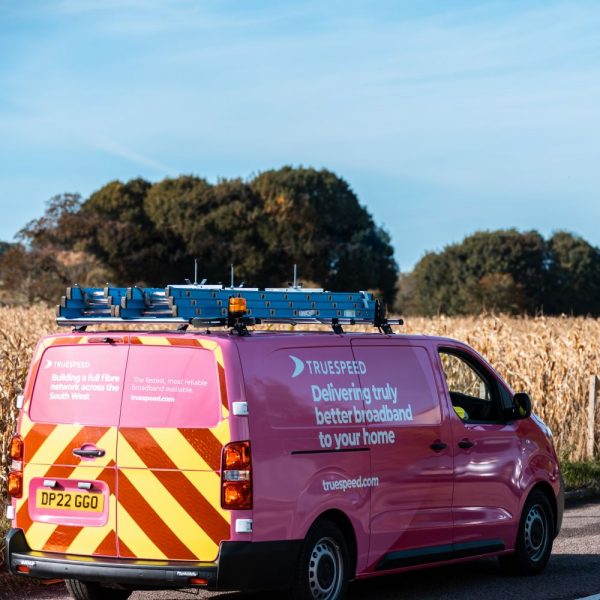UK ISP Truespeed Names 5 New FTTP Broadband Rollout Areas

Bath-based broadband ISP Truespeed has today announced the next phase of full fibre network expansion across the South West of England, which will see them extend their 10Gbps capable Fibre-to-the-Premises (FTTP) service to cover a further 5 locations – reflecting an investment of £24m to reach another 21,000 premises.
The operator, which holds an “ambitious” overall target of reaching 500,000 properties by the end of 2026 (mostly across Devon, Wiltshire and Somerset), is currently being funded by a total investment of £175 million from Aviva (£134m of which has already been committed to physical builds). The latest rollout extension thus flows from that same source of funding.
Under the plan, the next five locations to be reached by the operator’s rollout include: Beckington, Frome, Faulkland, Norton St Philips and Trowbridge. Related engineering work is due to start in late Spring and moving into early Summer 2023.
Advertisement
On top of that, Truespeed has also today announced the start of infrastructure works to connect other areas of the region as part of the investment, including Chipping Sodbury, Frampton Cotterell, Mark, Walton, Woolavington, Atworth, and Colerne (some of these have been announced before).
James Lowther, Truespeed CEO, said:
“We are so proud of how far we have come in the last few years to help level the digital playing field in the South West. We are delighted to be investing in Wiltshire and The Mendips and to be connecting local homeowners to the reliable, guaranteed speed, ultrafast broadband service they deserve.
The need for broadband isn’t just about using your home computer anymore; a reliable connection is intrinsic to the smooth running of our day-to-day lives, linking everything from remotely operated thermostats, security cameras, smart meters to our TVs, mobile phones, tablets, and gaming consoles.
While there will be some initial disruption as we connect individual streets, we are committed to being part of the local community and achieving much greater long-term benefits for the area. To date we have connected over 150 schools and community centres across the South West, and supported many more clubs, societies, and charities – we are now actively looking for opportunities to support organisations in the area to demonstrate our commitment.”
As usual, there is a catch with today’s announcement, which reflects the fact that Truespeed aren’t the only gigabit-capable broadband builder to be targeting some of the aforementioned locations. For example, both Frome and Trowbridge are also due to be covered by Netomnia’s (YouFibre) rival FTTP build.
Residential customers of the service typically pay from £25 per month on a 12-month term (£40 thereafter) for their entry-level 150Mbps package, which includes installation and a wireless router. This rises to £49 for their top 900Mbps tier (£70 thereafter), which adds a Linksys Wi-Fi 6 router.
Some of their existing areas include Glastonbury, Street, Shepton Mallet, Wells, Portishead, Clevedon, Keynsham, Saltford, Midsomer Norton, Radstock, Peasedown and Nailsea.
Advertisement
Mark is a professional technology writer, IT consultant and computer engineer from Dorset (England), he also founded ISPreview in 1999 and enjoys analysing the latest telecoms and broadband developments. Find me on X (Twitter), Mastodon, Facebook, BlueSky, Threads.net and Linkedin.
« Fibrus Plan Full Fibre Rollout for 40 Places in North East England





















































In addition to Netomnia, Trowbridge (picked as an example) is having Openreach FTTP built out currently, and already has Virgin Media availability. Possibly the altnets can piggyback on Openreach PIA to reduce the build cost, but I really can’t see any future where four separate physical networks will all be economically viable.
Not to mention that Truespeed has higher prices than Netomnia and Netomnia has already built majority of Trowbridge and Frome. This will be a cash burn
Shame isn’t it? Half the country don’t have any FTTP option (albeit half of those have a cable option), and yet ineffectual regulation is resulting in good money being spent on quadruplicate overbuild. That can’t work well for the investors, customers, or the market. In this case, Aviva are likely investing pension or insurance fund money.
Remarkable, the risks people will take with other people’s money.
The customers always benefit from competition
Disagree with the “regulation”: you should be allowed to burn cash however you want it. If you want to take a risk and open an italian restaurant on a road that already has 2 of them then the risk is on you. The govt has no business in dictating how companies should strategize. Truespeed made its bed, now they need to feel the pain.
Bduk already exists to cover non commercially viable homes, however they should be more careful to avoid overbuild
Customers don’t always benefit from competition, and certainly not where unfettered competition imposes external costs. In economic theory of course competition is the answer, but since perfect markets are required for the theory to work and there’s no perfect markets then it doesn’t follow that more competition always works.
It is the view of the government that competition and markets are the solution, but results in practice are highly variable, and government of course work tirelessly to redirect the market to do what government want. Take energy – plenty of “choice”, but no choice at all in reality, resulting in high prices and plenty of bankruptcies. Go back a long way, and recall the massive hike in prices when directory enquiries was deregulated – how good was more choice then? Look at the “competition” benefits of the Channel Tunnel, or M6 Toll – more choice certainly and I’ve happily used both, but both resulted in massive losses to investors. Give the banking sector sufficient cheap credit and that always boosts competition in lending, and usually then results in a financial crisis where the losses get taken by the taxpayer and investors.
In the case of altnets, SOMEBODY is taking the risk and the eventual hit of economic losses (whether actual losses or opportunity costs) of unnecessary duplication, so although that may not be seen through the bills of the surviving providers, it’s a real cost to the economy. Whilst most investors style themselves “private equity” in reality that’s usually a fig-leaf to make investment results less transparent, and if you trace the money back it’s often investor-owned companies putting up investments in syndicate or through PE funds. If an Aviva-backed altnet goes bust, that won’t put your or my bills up, but it will have external costs that people like us do pay, like general insurance costing more next year, or poorer returns on a defined contribution pension pot. And the opportunity cost of altnet spending is massive – if you’re not familiar with the term, this simply refers to the benefits that spending the money elsewhere would have, and if we take altnet investment value (source INCA) at £25bn, there’s a heel of a lot could have been achieved for that sort of money.
Markets always function as well as they can, they certainly don’t always deliver the best outcome for citizens or customers.
Energy is, exactly as you said, heavily regulated. I cannot just simply open my coal plant and sell it in a specific town. Not many places actually have a free market in energy, Texas is one of the few. Energy is not a good comparison precisely because of heavy regulation. Roads are great and as you said, you are happy they exist and investors took the losses. Govt stepping in with taxpayer money is socialism, not a problem of the free market, happy to agree that socialism is evil.
A lot of pensions have some control over where your money goes to. This is an area where the US figured out long ago with their Roth IRA, where you actually have a lot of control. Give money to monkeys and they will buy bananas. If anything you are arguing that people should be more mindful over where their money goes to, not that investors should be somehow magically made immune to risk
I’d agree that investors should be more careful with their money, but lets not claim that telecoms is in anyway a deregulated market. Government can and do pull many levers for good and bad, they’re already using cross subsidy and direct taxpayer funding to support FTTP roll out.
And that’s because lots of people want FTTP (although many don’t care) few will actually willingly pay the marginal cost of installation. So for the lucky 50-60% it’s viable without external subsidy (but still some cross subsidy), for the remainder, they’re depending on active subsidy, or the hope that an altnet will come along and remain viable against improbable costs.
That reality doesn’t create a stable market for altnets to plan a business, it undermines returns for all investors, plus creates the mentioned economic risks and costs. Creating a mess is remarkably easy. Sorting a mess out is a lot more difficult, but the question is not what should have been done in the first place, but rather what can now be done to minimise the industry risks, support efficient and effective modernisation of our landline infrastructure.
To my mind using regulation to minimise overbuild would be one thing, as would requiring any over-builders to submit a business plan that shows how their business is sustainable including all key assumptions, as well as lodging with the regulator the sort of “living wills” that financial services are supposed to put in place, ensure an orderly disposal of assets if things turn to ash, and those could also require that technical architecture is cross industry compatible and properly documented.
I’m open to alternative ideas, but unfettered competition doesn’t seem to be an answer in a market that’s looking very frothy.
Local govt already dictates who can access their housing stocks and this can be very significant in councils that have tens of thousands of properties. It explains how community fibre took a relatively long time to get to Islington compared to all the other inner boroughs. Regulation with MDUs gives landlords a lot of power and makes building in these areas more risky
That leaves rural and these kinds of small town suburbs
It’s unfortunate where some local authorities choose to create obstacles but that’s between the council and its own voters rather than a structural aspect of the telecoms sector, or between the residents and the ALMO/RSL. MDU’s were the core business for Hyperoptic, and show what can be done in that segment of the market if the landlord is so minded, and for many years VM were pretty good at serving MDUs where the landlord was cooperative (don’t know if that is still the case).
If there’s any landlords with large unserved-by-FTTP portfolios, there’s an easy win for an altnet – most RSL’s are professionally managed, would be open to ideas for improvements paid for by somebody else, the trick is engaging with the right people, making a clear offer on sensible terms, and showing how what is proposed supports the residents and the objectives of the landlord.
Speaking of councils blocking their own housing stocks, Oxford was recently listed in this website as one of the cities with the lowest % of FTTP.
You think they care about their own voters? They are more interested in implementing 15minute cities/climate lockdowns/fines for simply driving your car/whatever you want to call it. To the point where a bollard became famous for getting torched and removed a dozen times by angry residents. When public service gets thrown out the window and instead the desire to become a dictator comes up, nothing good will come of it and slow internet is the least of their problems. Same applies to Khan in London
“If you want to take a risk and open an italian restaurant on a road that already has 2 of them then the risk is on you”
There’s an old saying that the best place to open a Chinese restaurant is in Chinatown – because that’s where hungry people go, who like Chinese food.
However, I’d say that most people’s choice of Internet service not based on speed or technology, it’s based on (a) price, and (b) a name they trust. This makes it *very* hard for newcomers to get a bite of the pie, unless they price very aggressively. It’s good news for those like Cityfibre who sell via big established brands.
“If you want to take a risk and open an italian restaurant on a road that already has 2 of them then the risk is on you”
And that’s the sort of competition that’s entirely acceptable. If the restaurant goes bust, then the relatively modest losses will be soaked up by the owner, and any creditors as part of their cost of doing business. However, if the alnet investments turn sour and wipe out billions that ultimately are from the financial services sector then I’m less convinced that the losses will be taken by the “risk capital” since history says government will always pull strings to shift the costs when financial services start bleating.
I’m in Frome. We have netomnia and openreach both live in our street for fttp, vm are here too but not fttp. I have seen true speed recently working in Frome. They have missed the boat here. I told them a couple of years ago to come to our estate but they were not interested back then… also they lock their routers down which I wouldn’t want personally.